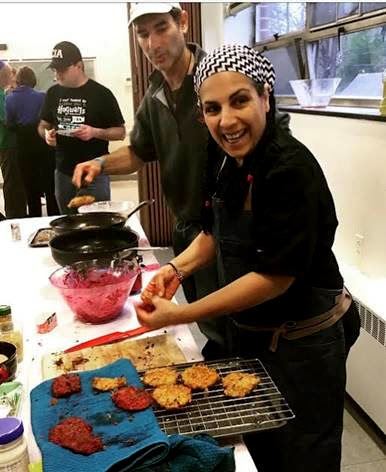I consider myself a balaboosta in training, as my Bubbe would say, using the Yiddish word for a Jewish homemaker who has it together. For this reason, my Torah of trying to cook food for family is The New York Times’ best-selling cookbook “Balaboosta” by feminist Israeli chef Einat Admony.

Admony came to my hometown, Washington, D.C., to judge Ohev Shalom’s Malchei haMitbach (Kings of the Kitchen) cooking contest and participate in a Chanukah cooking demonstration.
I interviewed Admony on how she’s bringing balaboosta back with her three incredibly successful New York restaurants: Taim Falafel, Balaboosta, and Bar Bolonat. We discussed Israeli cuisine as a trend and the importance of Israeli food in the Jewish diaspora.
While there are many chefs opening Israeli restaurants, Admony is making her name in a male-dominated cooking world – because, after all, to be a true balaboosta you need a whole lot of chutzpah and ruach, both of which Admony has in spades.
As she told Serious Eats, “I realized I was strong and pushy enough… So as a woman they would treat me a little bit differently until they realized I could kick ass.”
How did being in the Israeli army prepare you for the restaurant business?
I was a driver, but being in the army helped me to be more disciplined, punctual, clean, and organized. All these skills are necessary to be successful in the kitchen.
How do you think Israeli food differs from other Mediterranean cuisines?
Basically, I really believe Israeli food is very vegetable-centric. It’s also a melting pot of flavors from Morocco to Eastern Europe. It’s all about choices. The difference between Israeli cuisine compared to other cuisines is much like us [Jews], Israeli cooking is a melting pot of flavors. It comes from a lot of different cultures that came together throughout Israel.
When did you decide you wanted to be a chef?
I’ve always been cooking. I think when I was traveling, I wanted to do something I never could get tired of doing. So, I went back to Israel for culinary school and started from there.
What does it mean to you to be a balaboosta?
It’s the idea of cooking to bring people together. The world is different today and a bit tricky to juggle a career and family. To be a 21st-century balaboosta means navigating the pitfalls of life with a spirit of risk and adventure. Incidentally, the modern balaboosta can be male or female.
Do you have any new projects on the way?
Yes, I am working on a second cookbook, and I’m really excited about it – but it’s a surprise. So, stay tuned.
Einat Admony’s Recipe: Beet Latkes with Greek Yogurt Sauce
Makes 10-12 latkes
1 cup grated potato
2 cups beet
1⁄2 cups grated onion
1 egg
1 tablespoon chopped thyme leaves
4 tablespoons flour
1 teaspoon rosemary
1 tablespoon salt
1 pinch of freshly ground black pepper
canola oil
Right after the ingredients are grated, take a towel and squeeze out all the excess water from the potatoes and beets. Mix all of the above ingredients together in a mixing bowl. Heat up a saute pan with 1⁄2 inch of oil. When the oil is hot (around 370 degrees F) create 2 inch round patties from the mixture, and fry on both sides until they are golden brown.
For the yogurt sauce:
4 pieces preserved lemon, rinsed, seeded, and finely chopped
2 lemons, juiced
2/3 tablespoon honey
1⁄2 teaspoon turmeric
1 tablespoon extra virgin olive oil
1 cup Fage Greek Yogurt
Mix chopped preserved lemons with the honey to balance out the bitterness. Gently mix in the plain yogurt with the oil and lemon juice until you have a homogenous mixture. Add a pinch of turmeric for color, if you wish. Season with salt. Dollop Greek yogurt on your latkes and serve.
Michele Amira Pinczuk is a student at the University of Maryland.
